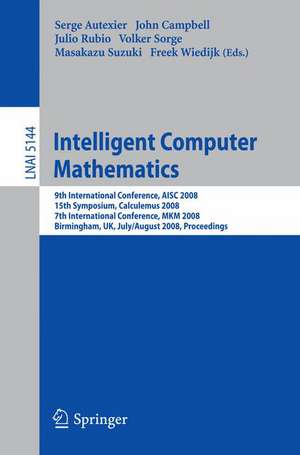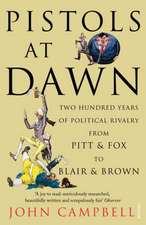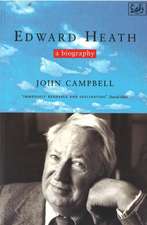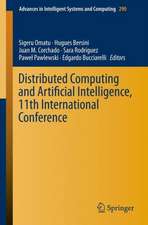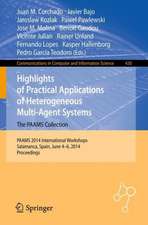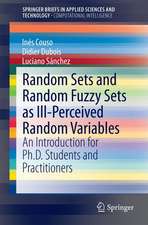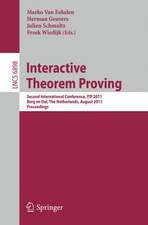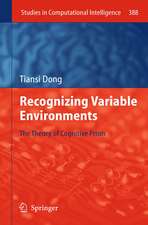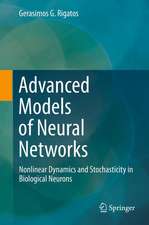Intelligent Computer Mathematics: 9th International Conference, AISC 2008 15th Symposium, Calculemus 2008 7th International Conference, MKM 2008 Birmingham, UK, July 28 - August 1, 2008, Proceedings: Lecture Notes in Computer Science, cartea 5144
Editat de Serge Autexier, John Campbell, Julio Rubio, Volker Sorge, Masakazu Suzuki, Freek Wiedijken Limba Engleză Paperback – 16 iul 2008
Din seria Lecture Notes in Computer Science
- 20%
 Preț: 1061.55 lei
Preț: 1061.55 lei - 20%
 Preț: 340.32 lei
Preț: 340.32 lei - 20%
 Preț: 341.95 lei
Preț: 341.95 lei - 20%
 Preț: 453.32 lei
Preț: 453.32 lei - 20%
 Preț: 238.01 lei
Preț: 238.01 lei - 20%
 Preț: 340.32 lei
Preț: 340.32 lei - 20%
 Preț: 438.69 lei
Preț: 438.69 lei -
 Preț: 449.57 lei
Preț: 449.57 lei - 20%
 Preț: 343.62 lei
Preț: 343.62 lei - 20%
 Preț: 148.66 lei
Preț: 148.66 lei - 20%
 Preț: 310.26 lei
Preț: 310.26 lei - 20%
 Preț: 256.27 lei
Preț: 256.27 lei - 20%
 Preț: 645.28 lei
Preț: 645.28 lei - 17%
 Preț: 427.22 lei
Preț: 427.22 lei - 20%
 Preț: 655.02 lei
Preț: 655.02 lei - 20%
 Preț: 307.71 lei
Preț: 307.71 lei - 20%
 Preț: 1075.26 lei
Preț: 1075.26 lei - 20%
 Preț: 591.51 lei
Preț: 591.51 lei -
 Preț: 381.21 lei
Preț: 381.21 lei - 20%
 Preț: 337.00 lei
Preț: 337.00 lei - 15%
 Preț: 438.59 lei
Preț: 438.59 lei - 20%
 Preț: 607.39 lei
Preț: 607.39 lei - 20%
 Preț: 538.29 lei
Preț: 538.29 lei -
 Preț: 389.48 lei
Preț: 389.48 lei - 20%
 Preț: 326.98 lei
Preț: 326.98 lei - 20%
 Preț: 1414.79 lei
Preț: 1414.79 lei - 20%
 Preț: 1024.44 lei
Preț: 1024.44 lei - 20%
 Preț: 579.30 lei
Preț: 579.30 lei - 20%
 Preț: 575.48 lei
Preț: 575.48 lei - 20%
 Preț: 583.40 lei
Preț: 583.40 lei - 20%
 Preț: 763.23 lei
Preț: 763.23 lei - 15%
 Preț: 580.46 lei
Preț: 580.46 lei - 17%
 Preț: 360.19 lei
Preț: 360.19 lei - 20%
 Preț: 504.57 lei
Preț: 504.57 lei - 20%
 Preț: 172.69 lei
Preț: 172.69 lei - 20%
 Preț: 369.12 lei
Preț: 369.12 lei - 20%
 Preț: 353.50 lei
Preț: 353.50 lei - 20%
 Preț: 585.88 lei
Preț: 585.88 lei -
 Preț: 410.88 lei
Preț: 410.88 lei - 20%
 Preț: 596.46 lei
Preț: 596.46 lei - 20%
 Preț: 763.23 lei
Preț: 763.23 lei - 20%
 Preț: 825.93 lei
Preț: 825.93 lei - 20%
 Preț: 649.49 lei
Preț: 649.49 lei - 20%
 Preț: 350.21 lei
Preț: 350.21 lei - 20%
 Preț: 309.90 lei
Preț: 309.90 lei - 20%
 Preț: 122.89 lei
Preț: 122.89 lei
Preț: 350.21 lei
Preț vechi: 437.76 lei
-20% Nou
Puncte Express: 525
Preț estimativ în valută:
67.02€ • 69.14$ • 56.72£
67.02€ • 69.14$ • 56.72£
Carte tipărită la comandă
Livrare economică 05-19 martie
Preluare comenzi: 021 569.72.76
Specificații
ISBN-13: 9783540851097
ISBN-10: 3540851097
Pagini: 602
Ilustrații: XIV, 602 p.
Dimensiuni: 155 x 235 x 38 mm
Greutate: 0.91 kg
Ediția:2008
Editura: Springer Berlin, Heidelberg
Colecția Springer
Seriile Lecture Notes in Computer Science, Lecture Notes in Artificial Intelligence
Locul publicării:Berlin, Heidelberg, Germany
ISBN-10: 3540851097
Pagini: 602
Ilustrații: XIV, 602 p.
Dimensiuni: 155 x 235 x 38 mm
Greutate: 0.91 kg
Ediția:2008
Editura: Springer Berlin, Heidelberg
Colecția Springer
Seriile Lecture Notes in Computer Science, Lecture Notes in Artificial Intelligence
Locul publicării:Berlin, Heidelberg, Germany
Public țintă
ResearchCuprins
Contributions to AISC 2008.- Symmetry and Search – A Survey.- On a Hybrid Symbolic-Connectionist Approach for Modeling the Kinematic Robot Map - and Benchmarks for Computer Algebra.- Applying Link Grammar Formalism in the Development of English-Indonesian Machine Translation System.- Case Studies in Model Manipulation for Scientific Computing.- Mechanising a Proof of Craig’s Interpolation Theorem for Intuitionistic Logic in Nominal Isabelle.- AISC Meets Natural Typography.- The Monoids of Order Eight and Nine.- Extending Graphical Representations for Compact Closed Categories with Applications to Symbolic Quantum Computation.- A Full First-Order Constraint Solver for Decomposable Theories.- Search Techniques for Rational Polynomial Orders.- Strategies for Solving SAT in Grids by Randomized Search.- Towards an Implementation of a Computer Algebra System in a Functional Language.- Automated Model Building: From Finite to Infinite Models.- A Groebner Bases Based Many-Valued Modal Logic Implementation in Maple.- On the Construction of Transformation Steps in the Category of Multiagent Systems.- Increasing Interpretations.- Contributions to Calculemus 2008.- Validated Evaluation of Special Mathematical Functions.- MetiTarski: An Automatic Prover for the Elementary Functions.- High-Level Theories.- Parametric Linear Arithmetic over Ordered Fields in Isabelle/HOL.- A Global Workspace Framework for Combining Reasoning Systems.- Effective Set Membership in Computer Algebra and Beyond.- Formalizing in Coq Hidden Algebras to Specify Symbolic Computation Systems.- Symbolic Computation Software Composability.- Using Coq to Prove Properties of the Cache Level of a Functional Video-on-Demand Server.- Automating Side Conditions in Formalized Partial Functions.- Combining Isabelleand QEPCAD-B in the Prover’s Palette.- Contributions to MKM 2008.- Digital Mathematics Libraries: The Good, the Bad, the Ugly.- Automating Signature Evolution in Logical Theories.- A Tactic Language for Hiproofs.- Logic-Free Reasoning in Isabelle/Isar.- A Mathematical Type for Physical Variables.- Unit Knowledge Management.- Authoring Verified Documents by Interactive Proof Construction and Verification in Text-Editors.- Verification of Mathematical Formulae Based on a Combination of Context-Free Grammar and Tree Grammar.- Specifying Strategies for Exercises.- Mediated Access to Symbolic Computation Systems.- Herbrand Sequent Extraction.- Visual Mathematics: Diagrammatic Formalization and Proof.- Normalization Issues in Mathematical Representations.- Notations for Living Mathematical Documents.- Cross-Curriculum Search for Intergeo.- Augmenting Presentation MathML for Search.- Automated Classification and Categorization of Mathematical Knowledge.- Kantian Philosophy of Mathematics and Young Robots.- Transforming the ar?iv to XML.- On Correctness of Mathematical Texts from a Logical and Practical Point of View.
Textul de pe ultima copertă
This book constitutes the joint refereed proceedings of the 9th International Conference on Artificial Intelligence and Symbolic Computation, AISC 2008, the 15th Symposium on the Integration of Symbolic Computation and Mechanized Reasoning, Calculemus 2008, and the 7th International Conference on Mathematical Knowledge Management, MKM 2008, held in Birmingham, UK, in July/August as CICM 2008, the Conferences on Intelligent Computer Mathematics.
The 14 revised full papers for AISC 2008, 10 revised full papers for Calculemus 2008, and 18 revised full papers for MKM 2008, plus 5 invited talks, were carefully reviewed and selected from a total of 81 submissions for a joint presentation in the book. The papers cover different aspects of traditional branches in CS such as computer algebra, theorem proving, and artificial intelligence in general, as well as newly emerging ones such as user interfaces, knowledge management, and theory exploration, thus facilitating the development of integrated mechanized mathematical assistants that will be routinely used by mathematicians, computer scientists, and engineers in their every-day business.
The 14 revised full papers for AISC 2008, 10 revised full papers for Calculemus 2008, and 18 revised full papers for MKM 2008, plus 5 invited talks, were carefully reviewed and selected from a total of 81 submissions for a joint presentation in the book. The papers cover different aspects of traditional branches in CS such as computer algebra, theorem proving, and artificial intelligence in general, as well as newly emerging ones such as user interfaces, knowledge management, and theory exploration, thus facilitating the development of integrated mechanized mathematical assistants that will be routinely used by mathematicians, computer scientists, and engineers in their every-day business.
